Unit 1 Honesty and responsibility Integrated skills 课件(共28张PPT)-译林版(2020)选择性必修第四册
文档属性
| 名称 | Unit 1 Honesty and responsibility Integrated skills 课件(共28张PPT)-译林版(2020)选择性必修第四册 | 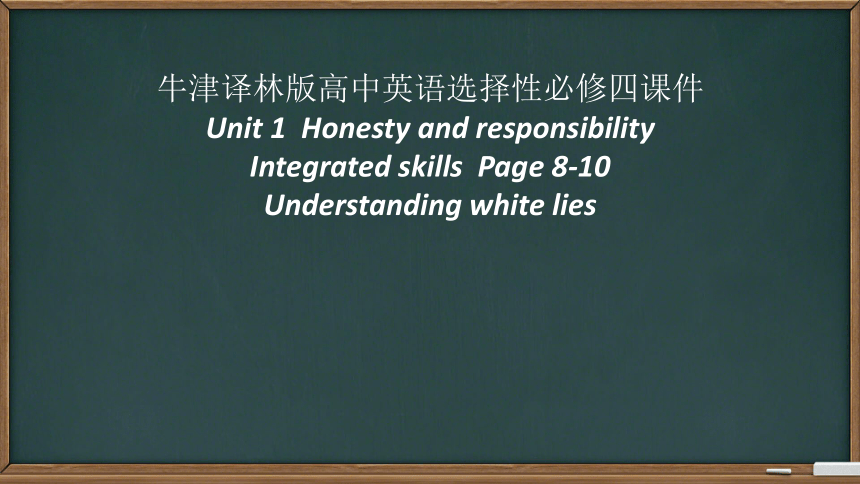 | |
| 格式 | pptx | ||
| 文件大小 | 280.3KB | ||
| 资源类型 | 教案 | ||
| 版本资源 | 牛津译林版(2019) | ||
| 科目 | 英语 | ||
| 更新时间 | 2025-07-28 13:27:46 | ||
图片预览

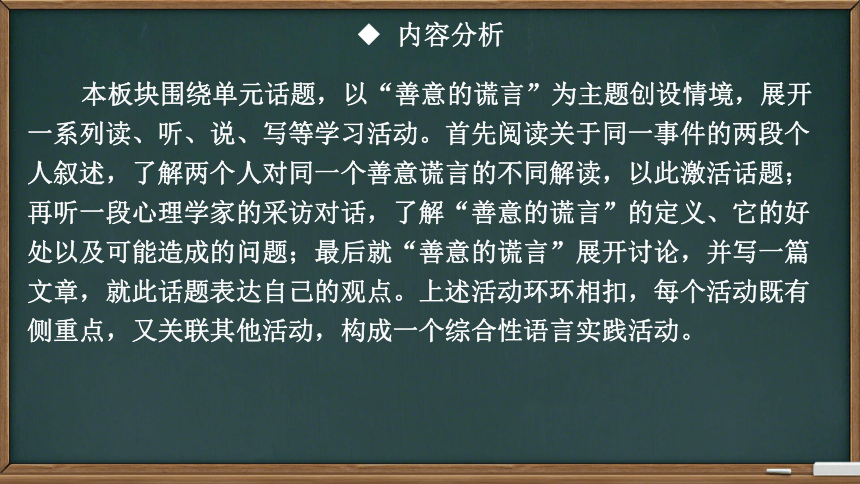
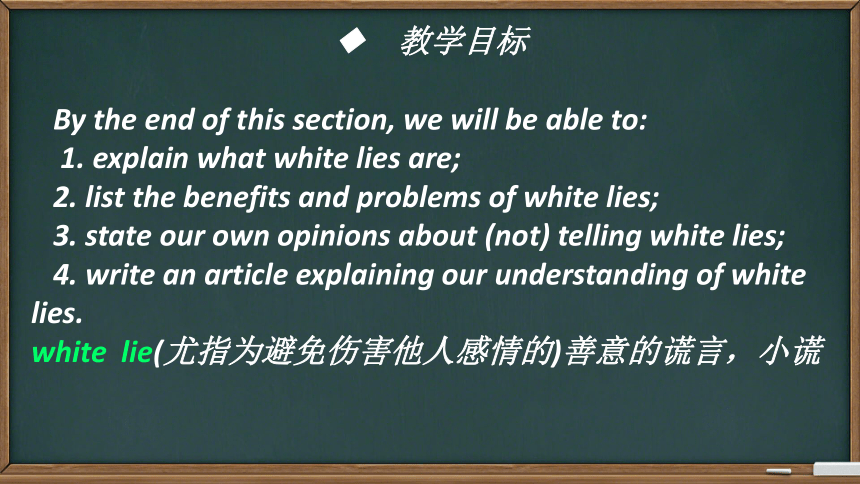
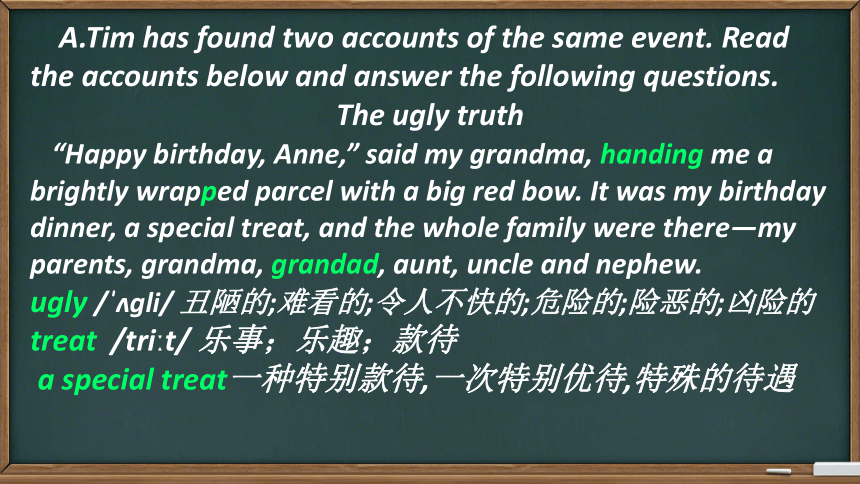
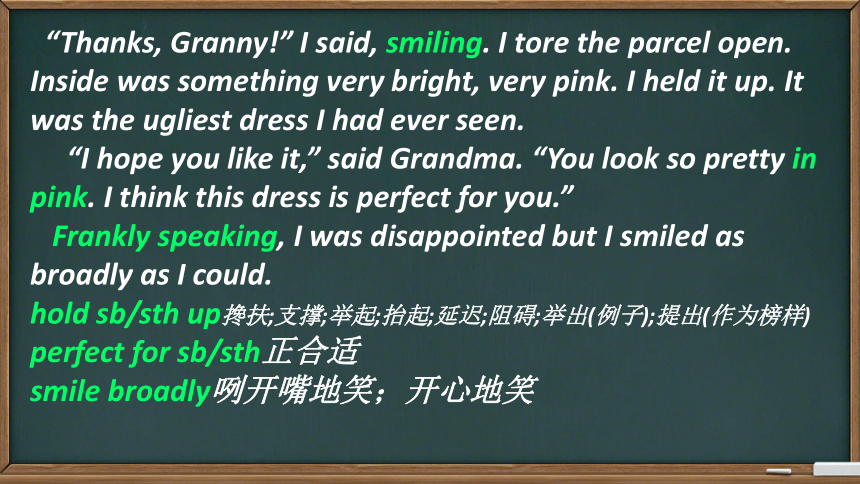
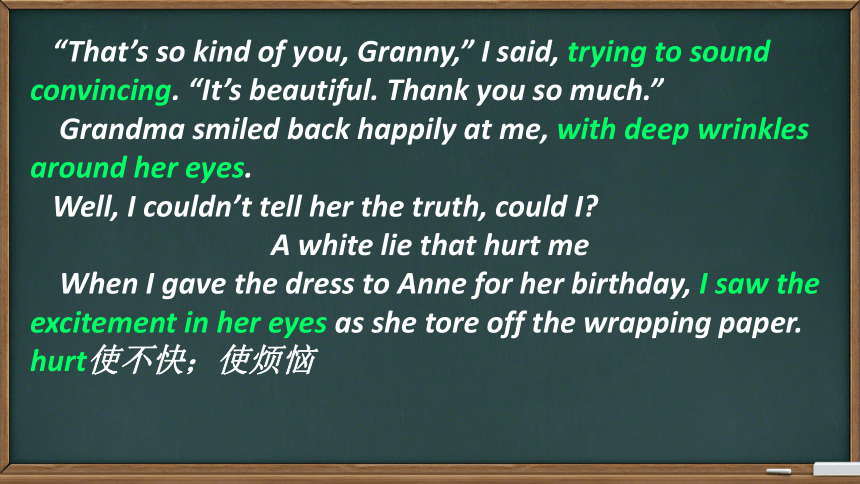
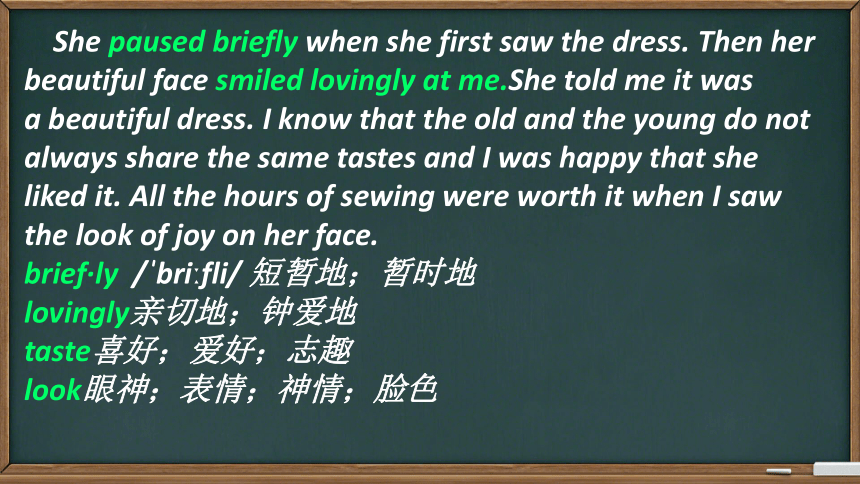
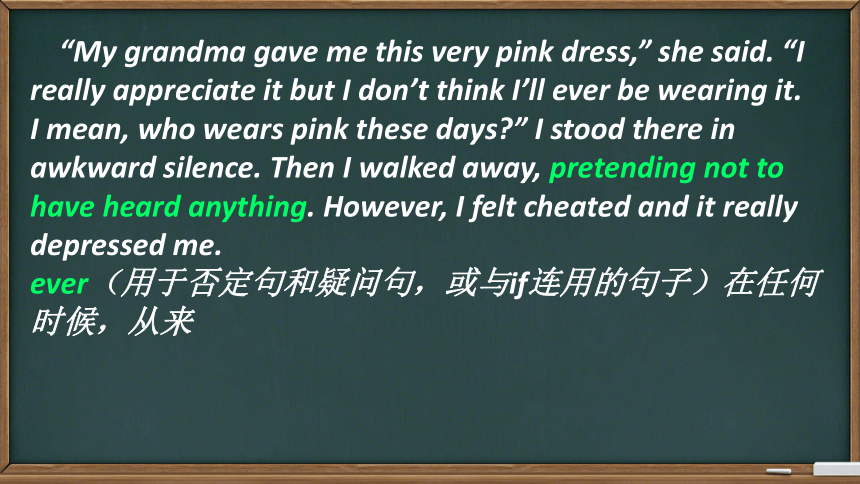
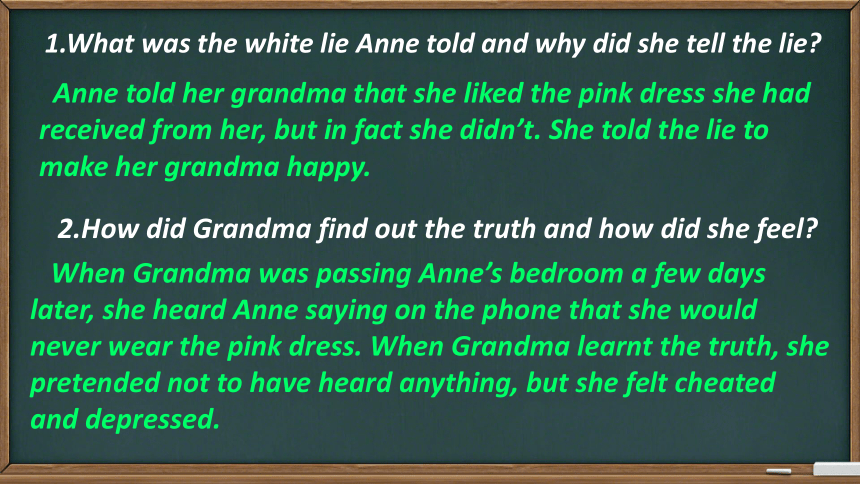
文档简介
(共28张PPT)
牛津译林版高中英语选择性必修四课件
Unit 1 Honesty and responsibility
Integrated skills Page 8-10
Understanding white lies
◆ 内容分析
本板块围绕单元话题,以“善意的谎言”为主题创设情境,展开一系列读、听、说、写等学习活动。首先阅读关于同一事件的两段个人叙述,了解两个人对同一个善意谎言的不同解读,以此激活话题;再听一段心理学家的采访对话,了解“善意的谎言”的定义、它的好处以及可能造成的问题;最后就“善意的谎言”展开讨论,并写一篇文章,就此话题表达自己的观点。上述活动环环相扣,每个活动既有侧重点,又关联其他活动,构成一个综合性语言实践活动。
◆ 教学目标
By the end of this section, we will be able to:
1. explain what white lies are;
2. list the benefits and problems of white lies;
3. state our own opinions about (not) telling white lies;
4. write an article explaining our understanding of white lies.
white lie(尤指为避免伤害他人感情的)善意的谎言,小谎
A.Tim has found two accounts of the same event. Read the accounts below and answer the following questions.
The ugly truth
“Happy birthday, Anne,” said my grandma, handing me a brightly wrapped parcel with a big red bow. It was my birthday dinner, a special treat, and the whole family were there—my parents, grandma, grandad, aunt, uncle and nephew.
ugly / ɡli/ 丑陋的;难看的;令人不快的;危险的;险恶的;凶险的
treat /tri t/ 乐事;乐趣;款待
a special treat一种特别款待,一次特别优待,特殊的待遇
“Thanks, Granny!” I said, smiling. I tore the parcel open. Inside was something very bright, very pink. I held it up. It was the ugliest dress I had ever seen.
“I hope you like it,” said Grandma. “You look so pretty in pink. I think this dress is perfect for you.”
Frankly speaking, I was disappointed but I smiled as broadly as I could.
hold sb/sth up搀扶;支撑;举起;抬起;延迟;阻碍;举出(例子);提出(作为榜样)
perfect for sb/sth正合适
smile broadly咧开嘴地笑;开心地笑
“That’s so kind of you, Granny,” I said, trying to sound convincing. “It’s beautiful. Thank you so much.”
Grandma smiled back happily at me, with deep wrinkles around her eyes.
Well, I couldn’t tell her the truth, could I
A white lie that hurt me
When I gave the dress to Anne for her birthday, I saw the excitement in her eyes as she tore off the wrapping paper.
hurt使不快;使烦恼
She paused briefly when she first saw the dress. Then her beautiful face smiled lovingly at me.She told me it was
a beautiful dress. I know that the old and the young do not always share the same tastes and I was happy that she liked it. All the hours of sewing were worth it when I saw the look of joy on her face.
brief·ly / bri fli/ 短暂地;暂时地
lovingly亲切地;钟爱地
taste喜好;爱好;志趣
look眼神;表情;神情;脸色
“My grandma gave me this very pink dress,” she said. “I really appreciate it but I don’t think I’ll ever be wearing it.
I mean, who wears pink these days ” I stood there in awkward silence. Then I walked away, pretending not to have heard anything. However, I felt cheated and it really depressed me.
ever(用于否定句和疑问句,或与if连用的句子)在任何时候,从来
1.What was the white lie Anne told and why did she tell the lie
2.How did Grandma find out the truth and how did she feel
Anne told her grandma that she liked the pink dress she had received from her, but in fact she didn’t. She told the lie to make her grandma happy.
When Grandma was passing Anne’s bedroom a few days later, she heard Anne saying on the phone that she would never wear the pink dress. When Grandma learnt the truth, she pretended not to have heard anything, but she felt cheated and depressed.
B. Tim is listening to an interview on white lies. Listen and finish the exercises below. Page 9
B1. Listen to the interview and decide whether the following statements are true (T) or false (F). Circle the incorrect information in the false statements and correct it in the blanks.
1.John is a university professor with a special interest in the truth and lies. T / F
2.According to John, only some people tell white lies from time to time. T / F
3.When people find out that they have been told a white lie, they may start to wonder what other lies they have been told. T / F
4.The interviewer tries to sound humorous when she says that she is being honest. T / F
psychologist
we all
B2. Listen to the interview again and complete the notes below.
What are white lies
(1) ______ lies you tell to protect other people
What are the benefits of white lies
Avoiding hurting people’s feelings
Helping (2) ______________________
What are the (3) ________ of white lies
Causing unexpected embarrassment or (4) _______ for the people being lied to
leading to a crisis of (5) _____
Small
strengthen relationships
problems
trouble
trust
Tapescript
Interviewer: Good evening to all our listeners. With me in the studio is John Lyons, a psychologist with a special interest in the truth and lies. Welcome, John.
John:Thank you.
Interviewer: Perhaps you could start by explaining what white lies are
John: OK, well ... white lies are small lies you tell to protect other people. We all tell white lies from time to time. For example, have you ever said you think certain food tastes nice, even when you think it is horrible
Interviewer: Um ... yes.
John: This is a white lie. We tell these kinds of lies to avoid hurting people’s feelings. Last week, a friend asked me, “Do you like my new haircut ” Instead of saying what I really thought, I said, “Yes, it looks really lovely.” I didn’t want her to be upset, because I care about her. These kinds of white lies also help strengthen relationships because they protect the people who are important to us.
Interviewer: Is telling white lies always a good thing to do
John: No. Although people tell white lies with good intentions, white lies are not without their problems. They may cause unexpected embarrassment or trouble for the people being lied to. Suppose your friend is dressed too formally for an informal party but you tell her out of kindness that you think she looks perfect. She takes it seriously, goes to the party and realizes that she is dressed
improperly. How embarrassed she would feel!
Interviewer: So well-meaning lies may also cause harm to people. well-meaning善意的 (但却常事与愿违)
John: Exactly. What’s more, as with any lie, there’s always a risk that people being told a white lie will find out the truth. This could lead to a crisis of trust as they may start to wonder what other lies you have told them.
Interviewer: Thank you, John. I’m being honest when I say that was very interesting.
C. In pairs, have a discussion about white lies. Use the following questions and expressions to help you.
What are white lies
Do white lies always bring about good results Why or why not
Would you tell white lies or not Why
Expressions:
Making concessions
Although/Though/Even though/Even if ..., ...
Despite ..., ...
Regardless of ..., ...
It is true that ..., but ...
I admit ...; however, ...
While ..., I can see that ...
Possible answer
A: Generally speaking, white lies are small lies. We tell them to protect someone because we don’t want to hurt their feelings, or we want to be polite.
B: I may tell my best friend that she sings well when she doesn’t.
A: I admit the aim is to maintain good relations with people who are important to us; however, white lies don’t always bring about good results.
B: Agree. They may cause unexpected embarrassment or trouble for the people being lied to. There’s always the possibility that people will find out the truth.
A: Exactly! For instance, your friend wants to participate in the school singing competition. You know she sings badly and will need some professional lessons if she wants to take part. Despite this, you tell her out of kindness that she will certainly win the competition because she’s an excellent singer.
Then she loses in the first round and feels embarrassed because she notices other students laughing at her. She may wonder why you said she was great, and she would be angry with you for lying to her. She may start to wonder what other lies you’ve told her.
B: It’s true that we take a big risk when we tell white lies, but if we don’t tell them, we might hurt those we care about. Would you tell white lies or not
A: While I think choosing not to tell white lies can be difficult, I can see that the danger of ruining my relationships is higher if I’m caught lying. For this reason,
I choose not to use white lies and rather face the consequences of always being honest.
B: And in doing so, people will always know that their trust in you is not misplaced. Great choice!
catch当场发现(或发觉)
mis·place / m s ple s/错误地信任某人; 随意搁置,乱放(而一时找不到)
D. Write an article explaining your understanding of white lies. Use your ideas from part C and the information in parts A and B to help you. Page 10
Planning your writing
Learning about the structure
When you explain your understanding of white lies, you can follow the structure below:
Define white lies and illustrate the definition with examples.
Explain why people tell white lies.
Raise doubts about the idea that white lies always bring about good results,and give reasons.
State whether you will tell white lies and explain why.
Learning about writing techniques
You should use diverse language in your writing. Firstly, you can try to vary the vocabulary you choose. For example,when you mean lying, you can use tell a lie, make up a story, withhold the truth, etc.
with·hold sth (from sb/sth) /w h ld/ 拒绝给;不给
Secondly, you can use different sentence structures. She told a lie to him and The truth was withheld from him by her convey nearly the same meaning but use different structures with varying degrees of formality.
for·mal·ity /f m l ti/ (性质)正式,正式性;正式手续;例行公事;遵守礼节
Checking your writing
Remember to check your writing after you finish and exchange drafts between you and your partner. Pay attention to the following aspects:
Punctuation Spelling Grammar
Choice of words Style (formal/informal) Structure
Self-review
How do you define white lies Can you give any examples
How well can you use diverse language in your writing
Peer review
What does your partner think of your understanding of white lies
What suggestions does your partner give to improve your writing
Possible answer
White lies
White lies are small lies that we tell to protect someone because we do not want to hurt their feelings, or we want to be polite. For example, you may tell your best friend that she sings well when she does not, or you tell your mum that the food she cooks is excellent instead of what you really think. These kinds of white lies help maintain good relations with people who are important to us.
However, white lies do not always bring about good results. They may cause unexpected embarrassment or trouble for the people being lied to. What’s more,there is always a risk that people being told a white lie will find out the truth. If a white lie is discovered, it can cause a crisis of trust and possibly damage the relationship. For instance, your friend wants to participate in the school singing
competition. You know she sings badly and will need some professional lessons if she wants to take part.Despite this, you tell her out of kindness that she will certainly win the competition because she is a great singer.
When she loses in the first round and notices other students laughing at her, she feels embarrassed and realizes you lied to her. She is certain to become angry with you and start to wonder what other lies she has been told.
Choosing not to tell white lies can be difficult because it means you risk hurting those you care about. However, the risk of ruining relationships is higher if you are caught in a lie. For this reason, I choose not to tell white lies and I would rather face the consequences of always being honest so that people will know their trust in me is not misplaced.
牛津译林版高中英语选择性必修四课件
Unit 1 Honesty and responsibility
Integrated skills Page 8-10
Understanding white lies
◆ 内容分析
本板块围绕单元话题,以“善意的谎言”为主题创设情境,展开一系列读、听、说、写等学习活动。首先阅读关于同一事件的两段个人叙述,了解两个人对同一个善意谎言的不同解读,以此激活话题;再听一段心理学家的采访对话,了解“善意的谎言”的定义、它的好处以及可能造成的问题;最后就“善意的谎言”展开讨论,并写一篇文章,就此话题表达自己的观点。上述活动环环相扣,每个活动既有侧重点,又关联其他活动,构成一个综合性语言实践活动。
◆ 教学目标
By the end of this section, we will be able to:
1. explain what white lies are;
2. list the benefits and problems of white lies;
3. state our own opinions about (not) telling white lies;
4. write an article explaining our understanding of white lies.
white lie(尤指为避免伤害他人感情的)善意的谎言,小谎
A.Tim has found two accounts of the same event. Read the accounts below and answer the following questions.
The ugly truth
“Happy birthday, Anne,” said my grandma, handing me a brightly wrapped parcel with a big red bow. It was my birthday dinner, a special treat, and the whole family were there—my parents, grandma, grandad, aunt, uncle and nephew.
ugly / ɡli/ 丑陋的;难看的;令人不快的;危险的;险恶的;凶险的
treat /tri t/ 乐事;乐趣;款待
a special treat一种特别款待,一次特别优待,特殊的待遇
“Thanks, Granny!” I said, smiling. I tore the parcel open. Inside was something very bright, very pink. I held it up. It was the ugliest dress I had ever seen.
“I hope you like it,” said Grandma. “You look so pretty in pink. I think this dress is perfect for you.”
Frankly speaking, I was disappointed but I smiled as broadly as I could.
hold sb/sth up搀扶;支撑;举起;抬起;延迟;阻碍;举出(例子);提出(作为榜样)
perfect for sb/sth正合适
smile broadly咧开嘴地笑;开心地笑
“That’s so kind of you, Granny,” I said, trying to sound convincing. “It’s beautiful. Thank you so much.”
Grandma smiled back happily at me, with deep wrinkles around her eyes.
Well, I couldn’t tell her the truth, could I
A white lie that hurt me
When I gave the dress to Anne for her birthday, I saw the excitement in her eyes as she tore off the wrapping paper.
hurt使不快;使烦恼
She paused briefly when she first saw the dress. Then her beautiful face smiled lovingly at me.She told me it was
a beautiful dress. I know that the old and the young do not always share the same tastes and I was happy that she liked it. All the hours of sewing were worth it when I saw the look of joy on her face.
brief·ly / bri fli/ 短暂地;暂时地
lovingly亲切地;钟爱地
taste喜好;爱好;志趣
look眼神;表情;神情;脸色
“My grandma gave me this very pink dress,” she said. “I really appreciate it but I don’t think I’ll ever be wearing it.
I mean, who wears pink these days ” I stood there in awkward silence. Then I walked away, pretending not to have heard anything. However, I felt cheated and it really depressed me.
ever(用于否定句和疑问句,或与if连用的句子)在任何时候,从来
1.What was the white lie Anne told and why did she tell the lie
2.How did Grandma find out the truth and how did she feel
Anne told her grandma that she liked the pink dress she had received from her, but in fact she didn’t. She told the lie to make her grandma happy.
When Grandma was passing Anne’s bedroom a few days later, she heard Anne saying on the phone that she would never wear the pink dress. When Grandma learnt the truth, she pretended not to have heard anything, but she felt cheated and depressed.
B. Tim is listening to an interview on white lies. Listen and finish the exercises below. Page 9
B1. Listen to the interview and decide whether the following statements are true (T) or false (F). Circle the incorrect information in the false statements and correct it in the blanks.
1.John is a university professor with a special interest in the truth and lies. T / F
2.According to John, only some people tell white lies from time to time. T / F
3.When people find out that they have been told a white lie, they may start to wonder what other lies they have been told. T / F
4.The interviewer tries to sound humorous when she says that she is being honest. T / F
psychologist
we all
B2. Listen to the interview again and complete the notes below.
What are white lies
(1) ______ lies you tell to protect other people
What are the benefits of white lies
Avoiding hurting people’s feelings
Helping (2) ______________________
What are the (3) ________ of white lies
Causing unexpected embarrassment or (4) _______ for the people being lied to
leading to a crisis of (5) _____
Small
strengthen relationships
problems
trouble
trust
Tapescript
Interviewer: Good evening to all our listeners. With me in the studio is John Lyons, a psychologist with a special interest in the truth and lies. Welcome, John.
John:Thank you.
Interviewer: Perhaps you could start by explaining what white lies are
John: OK, well ... white lies are small lies you tell to protect other people. We all tell white lies from time to time. For example, have you ever said you think certain food tastes nice, even when you think it is horrible
Interviewer: Um ... yes.
John: This is a white lie. We tell these kinds of lies to avoid hurting people’s feelings. Last week, a friend asked me, “Do you like my new haircut ” Instead of saying what I really thought, I said, “Yes, it looks really lovely.” I didn’t want her to be upset, because I care about her. These kinds of white lies also help strengthen relationships because they protect the people who are important to us.
Interviewer: Is telling white lies always a good thing to do
John: No. Although people tell white lies with good intentions, white lies are not without their problems. They may cause unexpected embarrassment or trouble for the people being lied to. Suppose your friend is dressed too formally for an informal party but you tell her out of kindness that you think she looks perfect. She takes it seriously, goes to the party and realizes that she is dressed
improperly. How embarrassed she would feel!
Interviewer: So well-meaning lies may also cause harm to people. well-meaning善意的 (但却常事与愿违)
John: Exactly. What’s more, as with any lie, there’s always a risk that people being told a white lie will find out the truth. This could lead to a crisis of trust as they may start to wonder what other lies you have told them.
Interviewer: Thank you, John. I’m being honest when I say that was very interesting.
C. In pairs, have a discussion about white lies. Use the following questions and expressions to help you.
What are white lies
Do white lies always bring about good results Why or why not
Would you tell white lies or not Why
Expressions:
Making concessions
Although/Though/Even though/Even if ..., ...
Despite ..., ...
Regardless of ..., ...
It is true that ..., but ...
I admit ...; however, ...
While ..., I can see that ...
Possible answer
A: Generally speaking, white lies are small lies. We tell them to protect someone because we don’t want to hurt their feelings, or we want to be polite.
B: I may tell my best friend that she sings well when she doesn’t.
A: I admit the aim is to maintain good relations with people who are important to us; however, white lies don’t always bring about good results.
B: Agree. They may cause unexpected embarrassment or trouble for the people being lied to. There’s always the possibility that people will find out the truth.
A: Exactly! For instance, your friend wants to participate in the school singing competition. You know she sings badly and will need some professional lessons if she wants to take part. Despite this, you tell her out of kindness that she will certainly win the competition because she’s an excellent singer.
Then she loses in the first round and feels embarrassed because she notices other students laughing at her. She may wonder why you said she was great, and she would be angry with you for lying to her. She may start to wonder what other lies you’ve told her.
B: It’s true that we take a big risk when we tell white lies, but if we don’t tell them, we might hurt those we care about. Would you tell white lies or not
A: While I think choosing not to tell white lies can be difficult, I can see that the danger of ruining my relationships is higher if I’m caught lying. For this reason,
I choose not to use white lies and rather face the consequences of always being honest.
B: And in doing so, people will always know that their trust in you is not misplaced. Great choice!
catch当场发现(或发觉)
mis·place / m s ple s/错误地信任某人; 随意搁置,乱放(而一时找不到)
D. Write an article explaining your understanding of white lies. Use your ideas from part C and the information in parts A and B to help you. Page 10
Planning your writing
Learning about the structure
When you explain your understanding of white lies, you can follow the structure below:
Define white lies and illustrate the definition with examples.
Explain why people tell white lies.
Raise doubts about the idea that white lies always bring about good results,and give reasons.
State whether you will tell white lies and explain why.
Learning about writing techniques
You should use diverse language in your writing. Firstly, you can try to vary the vocabulary you choose. For example,when you mean lying, you can use tell a lie, make up a story, withhold the truth, etc.
with·hold sth (from sb/sth) /w h ld/ 拒绝给;不给
Secondly, you can use different sentence structures. She told a lie to him and The truth was withheld from him by her convey nearly the same meaning but use different structures with varying degrees of formality.
for·mal·ity /f m l ti/ (性质)正式,正式性;正式手续;例行公事;遵守礼节
Checking your writing
Remember to check your writing after you finish and exchange drafts between you and your partner. Pay attention to the following aspects:
Punctuation Spelling Grammar
Choice of words Style (formal/informal) Structure
Self-review
How do you define white lies Can you give any examples
How well can you use diverse language in your writing
Peer review
What does your partner think of your understanding of white lies
What suggestions does your partner give to improve your writing
Possible answer
White lies
White lies are small lies that we tell to protect someone because we do not want to hurt their feelings, or we want to be polite. For example, you may tell your best friend that she sings well when she does not, or you tell your mum that the food she cooks is excellent instead of what you really think. These kinds of white lies help maintain good relations with people who are important to us.
However, white lies do not always bring about good results. They may cause unexpected embarrassment or trouble for the people being lied to. What’s more,there is always a risk that people being told a white lie will find out the truth. If a white lie is discovered, it can cause a crisis of trust and possibly damage the relationship. For instance, your friend wants to participate in the school singing
competition. You know she sings badly and will need some professional lessons if she wants to take part.Despite this, you tell her out of kindness that she will certainly win the competition because she is a great singer.
When she loses in the first round and notices other students laughing at her, she feels embarrassed and realizes you lied to her. She is certain to become angry with you and start to wonder what other lies she has been told.
Choosing not to tell white lies can be difficult because it means you risk hurting those you care about. However, the risk of ruining relationships is higher if you are caught in a lie. For this reason, I choose not to tell white lies and I would rather face the consequences of always being honest so that people will know their trust in me is not misplaced.
同课章节目录
